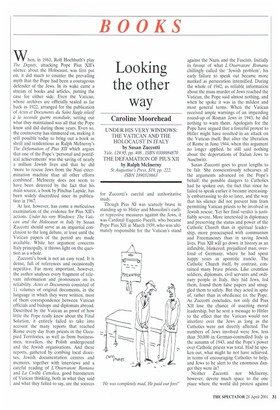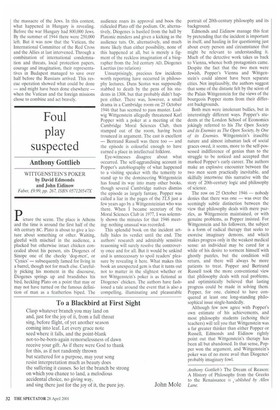Looking the other way
Caroline Moorehead
UNDER HIS VERY WINDOWS: THE VATICAN AND THE HOLOCAUST IN ITALY by Susan Zuccotti
Yale, 119.95, pp. 408, ISBN 0300084870
THE DEFAMATION OF PIUS XII by Ralph McInerny
St Augustine's Press, $19, pp. 222, ISBN 1890318663
When, in 1963, Rolf Hochhuth's play The Deputy, attacking Pope Pius X1I's silence about the Holocaust, was first put on, it did much to counter the prevailing myth that the Pope had been a courageous defender of the Jews. In its wake came a stream of books and articles, putting the case for either side. Even the Vatican, whose archives are officially sealed as far back as 1922, arranged for the publication of Actes et Documents du Saint Siegle relatif a la seconde guerre mondiale, setting out what they maintained was all that the Pope knew and did during those years. Even so, the controversy has simmered on, making it still possible today to bring out a book as shrill and tendentious as Ralph McInerny's The Defamation of Pius XII which argues that one of the Pope's 'personal and pontifical achievements' was the saving of nearly a million Jewish lives and that he did 'more to rescue Jews from the Nazi extermination machine than all other efforts combined'. McInerny does not seem to have been deterred by the fact that his main source, a book by Pinchas Lapide, has been widely discredited since its publication in 1967.
At last, however, has come a meticulous examination of the evidence for Pius XII's actions. Under his very Windows: The Vatican and the Holocaust in Italy by Susan Zuccotti should serve as an impartial conclusion to the long debate, at least until the Vatican papers of the period are made available, While her argument concerns Italy principally, it throws light on the question as a whole.
Zuccotti's book is not an easy read. It is dense, full of references and occasionally repetitive. Far more important, however, the author analyses every fragment of relevant information and pronounces on its reliability. Actes et Documents consisted of 11 volumes of original documents, in the language in which they were written, most of them correspondence between Vatican officials and bishops and diplomats abroad. Described by the Vatican as proof of how little the Pope really knew about the Final Solution, it entirely failed to take into account the many reports that reached Rome every day from priests in the Occupied Territories, as well as from businessmen, travellers, the Polish underground and the Jewish organisations. And these reports, gathered by combing local dioceses, Jewish documentation centres and memoirs, together with interviews and a careful reading of L'Ossematore Romano and La Civilta Cattolica, good barometers of Vatican thinking, both in what they said and what they failed to say, are the sources
for Zuccotti's careful and authoritative study.
Though Pius XI was scarcely brave in standing up to Hitler and Mussolini's earlier repressive measures against the Jews, it was Cardinal Eugenio Pacelli, who became Pope Pius XII in March 1939, who was ultimately responsible for the Vatican's stand against the Nazis and the Fascists. Initially in favour of what L'Osservatore Romano chillingly called the 'Jewish problem', his early failure to speak out became more marked as persecution intensified. During the whole of 1942, as reliable information about the mass murder of Jews reached the Vatican, the Pope said almost nothing, and when he spoke it was in the mildest and most general terms. When the Vatican received ample warnings of an impending round-up of Roman Jews in 1943, he did nothing to warn them. Apologists for the Pope have argued that a forceful protest to Hitler might have resulted in an attack on the Vatican itself. But after the liberation of Rome in June 1944, when this argument no longer applied, he still said nothing about the deportations of Italian Jews to Auschwitz.
Susan Zuccotti goes to great lengths to be fair. She conscientiously rehearses all the arguments advanced on the Pope's behalf: the possible dangers to Catholics had he spoken out, the fact that since he failed to speak earlier it became increasingly embarrassing to do so later, and the way that his silence did not prevent him from permitting Vatican priests to be involved in Jewish rescue. Yet her final verdict is justifiably severe. More interested in diplomacy and preserving the status and power of the Catholic Church than in spiritual leadership, more preoccupied with communism and Freemasonry than in saving Jewish lives, Pius XII will go down in history as an inflexible, blinkered, prejudiced man, overfond of Germany, where he had spent happy years as apostolic nuncio. The Catholic Church itself, by contrast, contained many brave priests. Like countless soldiers, diplomats, civil servants and ordinary people in Italy, they hid Jews, fed them, found them false papers and smuggled them to safety. But they acted in spite of, rather than in obedience to, the Pope. As Zuccotti concludes, not only did Pius XII lose the chance of asserting moral leadership, but he sent a message to Hitler to the effect that the Vatican would not interfere over the Jews as long as the Catholics were not directly affected. The numbers of Jews involved were few, less than 50,000 in German-controlled Italy in the autumn of 1943, and the Pope's power over Catholic priests was total. Had he spoken out, what might he not have achieved, in terms of encouraging Catholics to help, and Jews to be alert to the enormous danger they were in?
Neither Zuccotti nor McInerny, however, devote much space to the one place where the world did protest against
the massacre of the Jews. In this context, what happened in Hungary is revealing. Before the war Hungary had 800,000 Jews. By the summer of 1944 there were 250,000 left. But it was now that the Vatican, the International Committee of the Red Cross and the Allies at last intervened. Through a combination of international condemnation and threats, local protection papers, courage and imagination, their representatives in Budapest managed to save over half before the Russians arrived. This rescue operation showed what could be done — and might have been done elsewhere — when the Vatican and the foreign missions chose to combine and act bravely.



































































 Previous page
Previous page